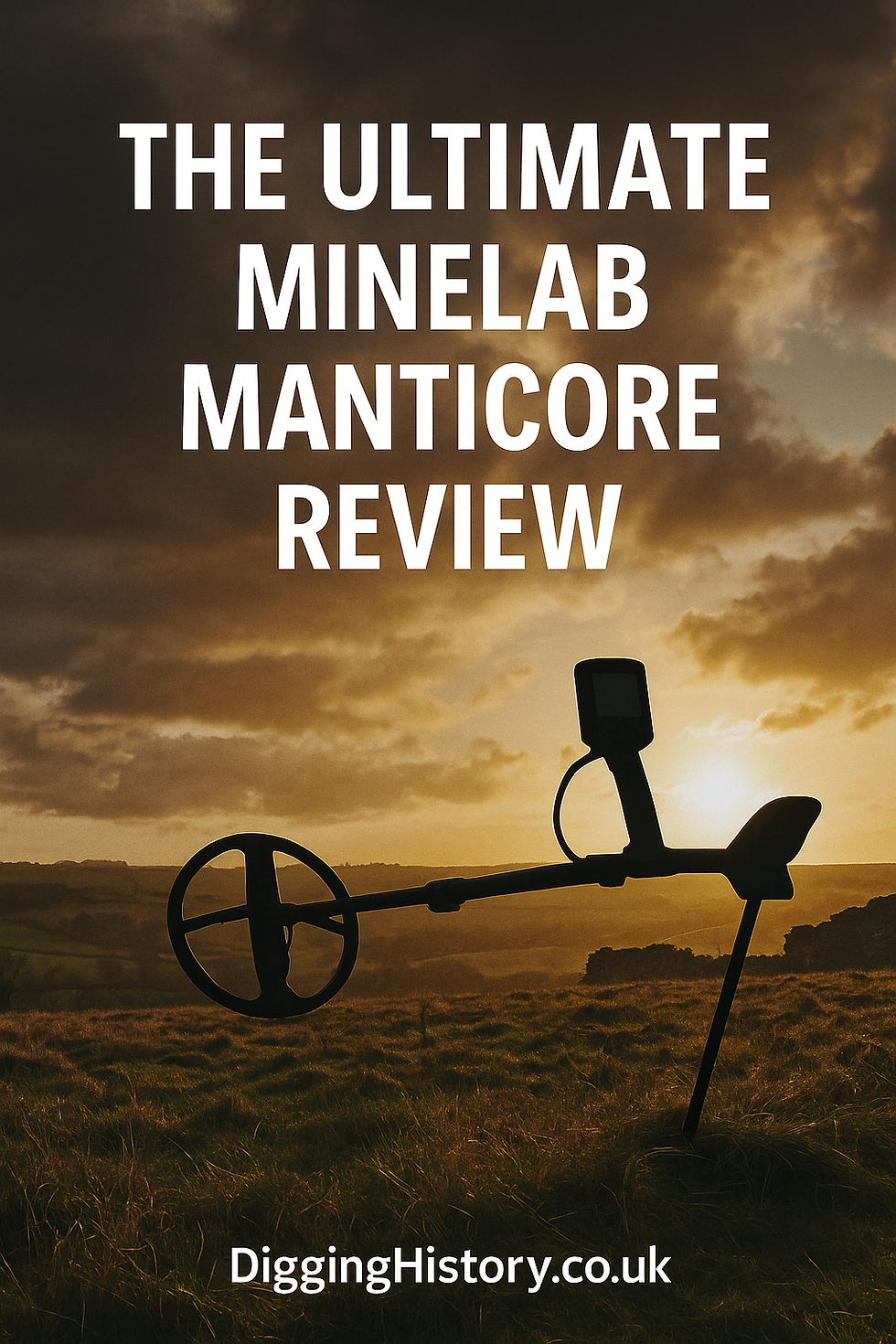Finds Liaison Officer (FLO): The Essential Guide for Detectorists & Archaeology Enthusiasts
- DiggingHistory.co.uk
- Sep 11
- 5 min read
Updated: Sep 13
If you're into metal detecting—or just fascinated by how everyday finds become part of national history—the role of the Finds Liaison Officer (FLO) is worth knowing inside out. These dedicated individuals connect the public, detectorists, museums, and the Portable Antiquities Scheme (PAS). This guide explains exactly what FLOs do, how they operate across the UK, how you can engage with one, and why they're indispensable to preserving the past.

What is a Finds Liaison Officer (FLO)?
A Finds Liaison Officer (FLO) is a professional—usually based in a county council or local museum—employed by the Portable Antiquities Scheme (PAS). The PAS is a national initiative run under the auspices of the British Museum that records archaeological finds made by members of the public, particularly through metal detecting. FLOs are the frontline staff who help individuals record their discoveries responsibly and accurately. Wikipedia British Museum
Why are FLOs important?
They identify, photograph, describe, and record your finds in the PAS database, improving public and scholarly understanding of Britain’s past. St Albans History Wikipedia
They help with Treasure reporting, liaising with coroners and museums under the Treasure Act 1996, and ensuring legally required artefacts are processed correctly. St Albans History British Museum
FLOs serve as a bridge between detectorists, landowners, archaeologists, and museums, encouraging best practice and collaboration. swheritage.org.ukLancashire.gov.uk
What Does a Day in the Life of an FLO Look Like?
Recording & Reporting Finds
FLOs spend much of their time identifying finds, taking detailed measurements, and photographing objects before uploading them to the PAS database, complete with contextual details—where and how they were discovered. St Albans History
Treasure Process Handling
When a potentially Treasured item is reported, FLOs assist in filling out the Treasure report, informing local museums, and guiding the finders through inquests and valuations. St Albans Historyswheritage.org.uk
Outreach & Community Engagement
A large part of the role involves attending metal detecting club meetings, rallies, museum ‘finds days’, and public talks, fostering trust and encouraging finder participation. swheritage.org.uk Sussex Past
Managing Volunteers and Partnerships
FLOs often recruit, train, and supervise volunteers, and coordinate with multiple heritage bodies to ensure local records (HERs) benefit from PAS data. swheritage.org.uk Sussex Past
Regional Variations & Administrative Duties
Roles can vary: Many FLOs work part-time (e.g., Sussex), with responsibilities tailored to regional needs—Treasure cases, outreach, volunteer coordination, and occasional strategic planning. Sussex Pastjobsearch.kent.gov.uk
FLOs By the Numbers & Scope
There are around 40 locally based FLOs covering England and Wales. They record everything from prehistoric flint to complex post-medieval finds. British Museum Wikipedia
Since 1997, the PAS has recorded over 1.4 million finds—a considerable portion processed by FLOs. British Museum
Example: In Lancashire and Cumbria alone, FLOs have processed over 19,000 objects, displayed in regional museums and the national database. Great public reach. lancashiremuseumsstories.wordpress.com
How You Can Work with or Access an FLO
Reporting Your Finds
If you discover something of historic interest—as a detectorist or walker—you can report to your local FLO. Use the PAS website to find contact details, or go via partner sites like the NCMD. National Council for Metal Detecting
Attending Finds Days or Club Meetings
FLOs often run ‘finds days’ at local museums where you can bring your finds in for recording, identification, and photography. Clubs frequently host these during meetings. lancashiremuseumsstories.wordpress.com The Detecting Hub
Best Recording Practice
Bring finds in person when possible—FLOs prefer handling artefacts directly, with proper documentation; some record by email, but delays are common during busy periods. finds.org.uk
FLOs are often overworked and under-resourced—their capacity varies a lot, so allow time for recording, and show patience. The Detecting Hublancashiremuseumsstories.wordpress.com
The FLO’s Role in Treasure & the Treasure Act 1996
Context on the Treasure Act
Under the Treasure Act 1996, finders must report items of gold or silver over 300 years old—or groups like hoards—to the coroner within 14 days. FLOs guide this process. British Museum St Albans History
New Criteria & FLO Responsibilities
The 3rd Revision of the Treasure Act Code (2023) broadened categories to include significant non-precious metal items over 200 years old. FLOs must interpret this expanded scope and support finders accordingly. lancashiremuseumsstories.wordpress.com British Museum
Liaison with Legal & Museum Systems
FLOs submit Treasure reports to both coroners and the British Museum. They liaise with curators about potential acquisitions and facilitate whole inquest and valuation process. St Albans Historyswheritage.org.uk British Museum
FLO Qualifications & Job Requirements
What FLOs Typically Need
An archaeology degree or equivalent experience.
Expertise in artefact identification, photography, measurements, database entry.
Strong IT and documentation skills (PAS online system, Photoshop).
Excellent communication and outreach ability. swheritage.org.uk Lancashire.gov.uk Sussex Past
Sample Job Description (Sussex)
Handle 40–50 Treasure cases per year.
Record all finds with detailed imagery and metadata.
Liaise with detector clubs and manage volunteers.
Offer public talks, support outreach, and attend regional PAS meetings. Sussex Past
Kent Example: FLO and Treasure Finds Liaison Assistant (TFLA)
Kent employs both a FLO and a TFLA, the latter supporting the FLO with treasure processing, public enquiries, and club liaison. Important in high find-density regions. jobsearch.kent.gov.uk
FLOs & Detectorists: Building Trust and Good Practice
How FLOs Enhance Detectorist Experience
They provide professional reassurance and validation for finds.
They ensure your discoveries contribute to public knowledge and heritage.
They advise on care, conservation, and recordkeeping beyond just identification. lancashiremuseumsstories.wordpress.com St Albans History
Detectorist Challenges with FLOs
Some detectorists report delayed responses or brief replies via email—highlighting the importance of in-person meets and patience. The Detecting Hublancashiremuseumsstories.wordpress.com
Tips for Smooth FLO Engagement
Attend finds days or club meetings where FLOs are present.
Always label finds with accurate findspot details and context—this speeds identification and recording.
Understand that FLOs are often part-time or shared across counties; demand often exceeds capacity. The Detecting Hublancashiremuseumsstories.wordpress.com
FLOs in the Broader PAS Network & Heritage Ecosystem
The PAS Structure
Managed by the British Museum, the PAS is funded by the DCMS and supported locally.
FLOs work with Finds Advisers, volunteers, and central PAS staff to maintain standards. Wikipedia British Museum
Data Sharing & Research
FLO entries feed into Historic Environment Records (HERs) and are freely accessible for research and public education. British Museum Wikipedia
Notable finds (e.g., Staffordshire Hoard, Crosby Garrett Helmet) began with FLO-supported reporting. Wikipedia
Getting the Most from FLO Interaction: Best Practices
Find your local FLO via the PAS or NCMD links. National Council for Metal Detecting British Museum
Bring the find in person with details and photos to finds days or meetings when possible.
Understand Treasure law and FLO role under the Treasure Act. British Museum
Be patient and polite—FLOs are often overbooked and under-resourced.
Join a local club that the FLO supports—this often grants better access to recording opportunities. The Detecting Hublancashiremuseumsstories.wordpress.com
Report responsibly: label, photograph, and ethically present your find. The FLO is your partner in recording and preserving history.
Final Word
FLOs are the gatekeepers to making your finds matter—not just to you, but to local museums, researchers, and future generations. They stand at the blend of archaeology, public service, law and enthusiast communities. By understanding their role, resources, and pressures, you become a better researcher, detectorist and custodian of the past.
All details are accurate as of September 2025, based on PAS, British Museum, Sussex Archaeological Society, Kent County Council and FLO job descriptions.





Comments